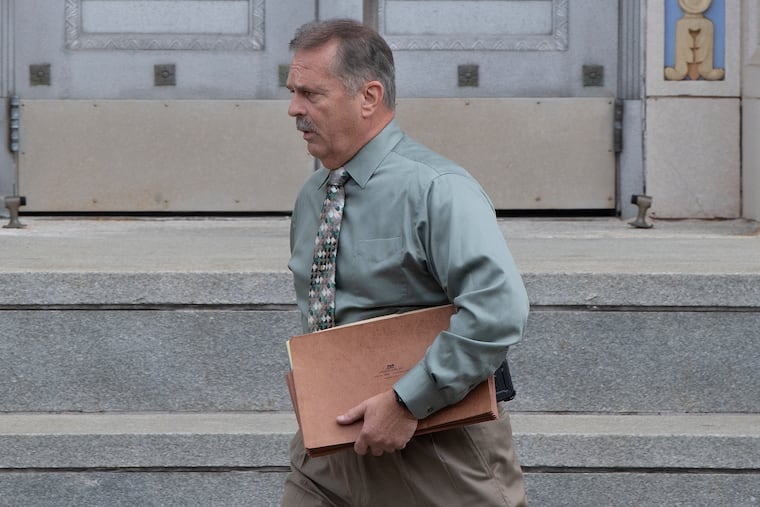Is racist speech a crime? Closing arguments heard in the trial of ex-Bordentown Township police chief.
The jury is expected to begin deliberations today in the hate-crime assault trial of former Bordentown Township Police Chief Frank Nucera Jr.

Was it hateful speech, but not a crime? Did former Bordentown Township Police Chief Frank Nucera Jr. slam the head of a handcuffed teenager against a wall because he was black?
A federal jury in Camden heard starkly different viewpoints Wednesday during closing arguments in Nucera’s hate-crime assault trial. The veteran law enforcement officer is also accused of civil rights violations and lying to the FBI. The jury deliberated for about two hours and talks are to resume at 9 a.m. Thursday.
At the center of the case are 81 recordings secretly made by a fellow officer in which Nucera is heard using the N-word and other racial slurs. Prosecutors say Nucera had a longstanding animosity against blacks and spoke about joining a firing squad to mow them down, and used police dogs to intimidate black spectators at high school basketball games.
“The defendant is not being charged for his words. He’s being held accountable for his actions,” Assistant U.S. Attorney Joseph Gribko told the jury, which includes three black women.
But defense attorney Rocco Cipparone urged the jurors not to confuse criminal justice with social justice. He described the case against Nucera as “all talk, no action.”
“Let’s move past the words, as ugly and embarrassing as they are,” Cipparone said. “Frank Nucera is guilty of using ugly words. But they do not equal action.”
The charges stem from the Sept. 1, 2016, arrest of Timothy Stroye, then 18, of Trenton, at a Ramada Inn in Bordentown Township. Nucera was among several officers who responded after Stroye got into a scuffle with police.
His own officers implicated Nucera in the alleged assault, which has made international headlines. Nucera, the officers said, compared African Americans to ISIS and regularly used racial slurs, including hours after the alleged assault.
Afterward, at the police station, Nucera told one of the officers who witnessed the confrontation that he and numerous other officers had responded to the call for backup because there were “six unruly [expletive, N-word]” at the hotel, authorities said.
Nucera was also captured on a cell phone recording made by Sgt. Nathan Roohr, the key prosecution witness, saying: “It would have been nice if that [expletive] dog could have come up. I’m telling you. You’d have seen two [expletive, N-word] stop dead in their tracks.”
In another recording commenting on the 2016 election, Nucera lauded President Donald Trump as “the great hope for white people.” He said Democratic nominee Hillary Clinton would ”give in to all the minorities.”
A legal expert has called the case “a mutiny” because more than half of the officers of the then-23-member South Jersey department secretly recorded the chief, breaking the “blue wall of silence.”
”They could have kept their heads low,” Gribko said. “They had nothing to gain. They had everything to lose.”
The case is also unusual in that a law enforcement officer is charged with a hate crime, according to Frank Pezzella, an associate professor at John Jay College of Criminal Justice, who has done research on hate crimes. “I think it speaks to the emboldenedness,” he said Wednesday.
Cipparone has contended that the officers disliked Nucera because of his tough disciplinary policies and wanted him out as chief. Among those who testified against Nucera was his second-in-command, Capt. Brian Pesce, who succeeded him as chief.
Nucera sat at the defense table staring in front of him in the crowded courtroom. His son, Frank III, also a Bordentown Township police officer, has been in court daily, along with several family members.
In his closing, Cipparone hammered away at inconsistencies in testimony by Roohr and Detective Sgt. Salvatore Guido, who both implicated Nucera and said they saw their chief strike Stroye. Roohr said Nucera palmed Stroye’s head “like a basketball” and slammed it against a wall in the hotel.
Assistant U.S. Attorney Molly Lorber dismissed the defense arguments as “a bunch of hooey.” She again told the jury Wednesday that what motivated Nucera to strike Stroye “was the fact that he was African American.”
“He didn’t want that [expletive, N-word] in his town,” Lorber said, quoting a statement by Nucera captured on a recording.
Nucera opted not to testify. Stroye was issued a subpoena, but neither side called him to the stand. Cipparone noted Stroye’s absence to the jury Wednesday.
”Where’s Timothy Stroye?” Cipparone asked.
Police were dispatched to the hotel after a manager said Stroye and his girlfriend, 16, were swimming in the pool and had not paid their bill. The two struggled with police and were eventually placed under arrest. Stroye was pepper-sprayed.
Stroye was charged with resisting arrest, assault on an officer, and theft, but a judge dismissed the charges.
Stroye has had several brushes with the law since the Ramada incident. His extensive criminal record could have been used to impeach his credibility. Stroye has said he could not identify who struck him because his eyes were burning from the pepper spray, but said he heard someone say “chief.”
Earlier Wednesday, U.S. District Judge Robert Kugler instructed the jury on the law. The trial is in its third week.
“This was a very, very hard-fought case,” the judge told the lawyers. “We’ll just have to wait and see.”
If convicted, Nucera could face up to 20 years in prison and forfeit his $8,800-a-month pension. His pension was frozen in March pending the outcome of the trial. He resigned from the department after a 34-year career in January 2017 after learning he was under investigation.